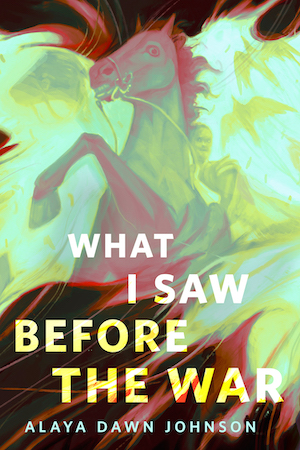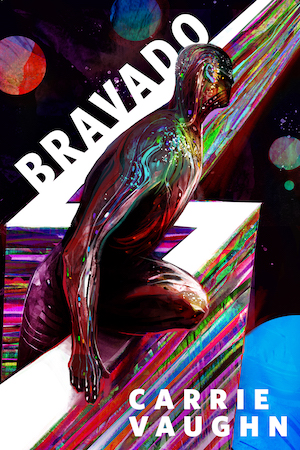At present, I have an alarming number of tabs open. I’m absolutely not going to tell you how many, or how many are open on my phone. There are 15 pages of notes in my now-finished notebook that are about the same subject that led to all these tabs. A lot of these tabs concern the history of a country I don’t live in. Some are mythology. It’s a real cornucopia of delights, and it’s also very distracting. There are so many rich and fascinating rabbit holes a person might fall down.
This is all because I’ve been reading a book that I don’t entirely understand, and frankly, it’s wonderful.
A very long time ago, I read Neal Stephenson’s Baroque Cycle, one at a time, as the books came out. I am—I cannot stress this enough—very bad at remembering historical details. Part of this I blame on high school. Part of this is just the way my brain works. I can tell you the basic plot of most books I’ve ever read, but I cannot tell you the names and dates involved with specific moments in the world’s past. While I read Stephenson’s sprawling series, I spent a lot of time referencing the encyclopedia, because I did not know, necessarily, which characters were based on real humans and which were entirely made up. It was really quite educational. (I also learned about kidney stones, which was less pleasant. But still kind of interesting.)
I could have just let it go, let the books roll me along in blissful ignorance. I understood the story structure and the characters just fine. I knew what he was getting at. It was just all that history that kept throwing me: Who? When? Why? But what happened, as I looked up names and places and dates and wars, is that I began to take almost as much joy in that process as I did in reading the books. The two things remain twined in my head, all these years later, and maybe some part of me is always looking for something else like that—something that will offer me a book, a story to read and inhabit, but also an adventure in not-knowing.
In recent years, I feel like it has been less common to find books to challenge me, and by me I mean their readers, and by “books” what I really mean is “publishing,” which can feel very focused on the sure thing, the brand name, the splashy debut that somehow speaks to millions and millions of people. Still, there are challenging, mystifying, weird-ass books being published all the time. To be fair, a weird-ass, mystifying, challenging book isn’t inherently a good book, or a book you want to spend your finite reading time on. We only get to read so many books in a month, or a year, or a life. There is value in escapism and familiarity and comfort.
But I still want to advocate for sometimes, at least sometimes, going out on a limb, out on a genre vacation, or just out into the wilds of a tale you don’t feel like you entirely understand.
It can feel, too often, like these books bobble and vanish in the big world of Book Discourse. I have searched weird corners of the internet for people talking about Alaya Dawn Johnson’s The Library of Broken Worlds, which requires patience, and a willingness to trust her incredible, vivid, dizzying worldbuilding. I think sometimes about how many books there are that American, English-language readers will never get to see, simply because they were too something to get translated here. I think about how lucky we are that Riverhead keeps publishing the great and unmatched Helen Oyeyemi, whose books are works of art that I can’t ever quite fit my head around—which is as it should be, for there is always something else to find in them. I think about how lucky we are that we get to read trippy and furious books like Molly McGhee’s Jonathan Abernathy You Are Kind, which is both deceptively easy to read and hard to fully fathom. Or perhaps what’s “hard” about it is that it’s hard to accept exactly how clearly it speaks to this moment in time.
McGhee’s Twitter bio used to say something about how literary and genre fiction ought to touch tongues more often, and I think about that, too: About the science fiction and fantasy that appears in the other section of bookstore, about all the SFF writers overlooked by the mainstream even as their prose is crystalline, elegant, looping, rich, just stunning. We build so many walls for ourselves about what we do and don’t do, read and don’t read. Some of it is simply practical: We’re back to the question of time, and how much of it we do or don’t have. When someone says “I am only reading X kinds of books,” they are drawing boundaries around their time as much as their taste.
I want, though, for us to have the time, the space, the mental bandwidth to welcome uncertainty, to crank up our curiosity and give the weird or confusing or just slightly unexpected books a chance. And I want it to be totally okay and acceptable and normal to say “I don’t entirely understand what I just read, but I loved it.”
When I started writing reviews, in the mid-2000s, there was a real pressure to be authoritative. To speak with your whole chest, even if you didn’t really know what you were on about. I’ve always been a little suspicious of this tendency—of an unwillingness to be transparent about the fact that every reader (and writer!) is coming from their own specific background and none of us knows everything about everything. Subjectivity is inevitable.
Maybe, just maybe, this requirement that we all pretend to know what we’re talking about at all times is a limiting thing. On today’s bookternet, a lot of us can go off about tropes and western story structure and the hero’s journey and probably also several other kinds of story structure we read about once or twice and maybe even there’s some of that Save the Cat guy baked in there, too. So it’s easy, in a way, to keep reading books from this sort of narrative tradition, because we know a bit of what we’re talking about. I can pick up a retelling of a Greek myth and know the basic beats because I grew up steeped in those stories.
But there are so many other stories, and so many other ways to tell them.
What set me off on this path of delirious not-knowing is that I read Vajra Chandrasekera’s Rakesfall. I read it on a plane, and I felt, later, like I dreamed it. Whole scenes existed in my mind stripped of any context, the way you might remember dreams.
And then I read it again, with a pen and a notebook and my phone and laptop at hand. I opened a million tabs, and revisited the general outline of the Ramayana, which I know as a Penguin Classic I read in book group some years back, not at all the way I know the stories and myths I met in textbooks as a child. I put off drafting a review of the book in favor of reading every interview with the author I could find. I put pieces together and, outside of my airplane dream-state, began to see where the story restarted, where it looped, where it ate its own tail and then birthed itself again.
There is so much I don’t entirely understand in this book, because I can’t; I’m a white American who does not have the cultural context to fully understand all the things that this story encompasses. And what I’m saying is: Good. Good, let me bask in that. Good, let me admit to that.
There is real joy to be found in not immediately understanding exactly what a book is doing. Joy in seeing that something outside of the narrative structure we’re familiar with is at play; joy in discovering a different sense of vastness and fluidity. Joy in waiting, patiently, with rich anticipation, for the seemingly disparate pieces of a narrative to mesh, to become something huge and beautiful. Joy in realizing, several chapters into a book, that you could not possibly say what it was “about” until reading to the end, and maybe not even then.











I too learned a lot from Stephenson’s Baroque cycle, although the paragraph that sticks in my mind relates to fleas and the sounds they make when pinging off of leather boots…
Fully love this take on reading even in the midst of confusion, or perhaps toward more confusion!
I was getting nowhere in the first Baroque cycle until I went through and read each of the POVs separately and a little clarity came through. Then I reread the whole thing.
I love this article. Thank you for writing it! I’ve also been slowly coming to this conclusion over the past few years, that it’s “ok” and even a good thing to be reading books that you don’t fully understand! I think I once thought that in order to “conquer” a book and feel good about reading it, I needed to fully grasp and intimately know all the concepts entertained therein. As I grow older, I’ve discovered that much like life itself, it’s ok to not fully understand and know all that which I read. So reading a book like The Master and Margarita or Solenoid(by Cartarescu) or even my current read (City of God by Augustine) actually brings delight to my soul as I enjoy the beauty of a new perspective and find myself more comfortable with not being one who is at the center of the universe and understanding all things.
I think we all could do well with being a little more comfortable with uncertainty and wonder, even in our reading.
This made me cheer and clap. Scared the hell out of my roommate, so bonus points awarded to you for that.
Believe me, finding out about kidney stones first-hand is even less pleasant.
I clearly need to reread the Baroque Cycle. I bought the books as they came out and loved them. I started reading them before smartphones were introduced so I didn’t do much research but my schooling allowed me to recognize many of the real characters and events.
My only problem now is getting into a mindset for reading three leviathan books.
But as to your broader point, yes. I enjoy challenging books. They are legal drugs for expanding your consciousness.
I’ve never been a How-To-Read-A-Book-Like-A-College-Professor type. I tend to let a book (or movie or piece of music) wash over me and simply savor the experience. I do so with a good measure of thoughtfulness but I’m usually more interested in tone, the musicality of the prose (all good writing, even the most terse and clipped, has a musical quality) and more than anything else, context. Context can add so many more potential layers especially in older works even if incidentally. I admit I’ll steer clear of denser and intricately constructed novels. They’re just not my cup of tea and I get no joy from having to do homework on a book. Just tell me a good story in a distinct voice.
Not wholly understanding a book can also leave room for it in a corner of your mind where it can linger for years, popping into your thoughts at the oddest times and that is a peculiar joy in itself. Perhaps it’s sometimes better to just feel a book in your own way.
An excellent article calling forth some excellent comments.
I read the first book in Stephenson’s Baroque Cycle some years ago, fully intending to read the next two books in short order. Alas, as much as I loved the first book (and I loved it a lot), I somehow never got to the other two. Time to correct that. And I’ve downloaded Molly McGhee’s book from my library — sounds like my kind of book! Thanks.
Years ago, I picked up Moonwise by Greer Gilman, for reasons that I still cannot explain, not being drawn to the lush, Romantic Tom Canty cover nor the “sister kidnapped to Faery” storyline. Then, I tried to read it, and found it was a portal fantasy written by James Joyce. All interior monologue, symbolic stream-of-consciousness prose. Wow. It was like reading a cryptogram, deciphering it piece by piece and feeling good whenever a chunk of narrative gave up its secrets. Or whenever I thought it did, at least.
I tried to read that book as a teenager and despite really, really wanting to like it, I did not get very far! I wonder if it’s time to try again (I’ve been carrying it around ever since, basically out of sheer fascination).
It and Ms. Gilman’s other works in the same milieu rely a lot on visual imagery. One key I discovered was imagining the nature art of Andy Goldsworthy, who is an influence on her, as Ms. Gilman told me after one of her readings.
This is a nice antidote to an article I read recently, about some tech bros who are making some kind of AI chat thing to help you understand books (and the examples they talked about are completely within the cultural understanding of their target audience…) I love this approach! It made me think of Same Bed Different Dreams.